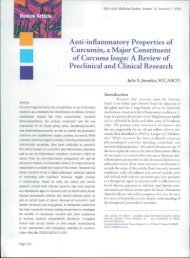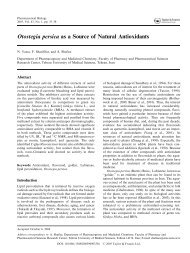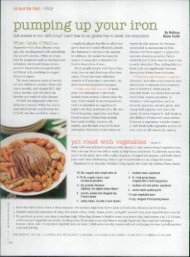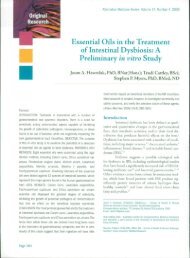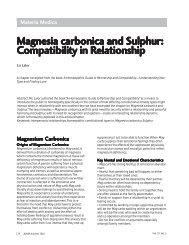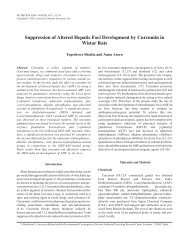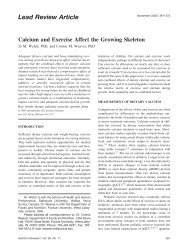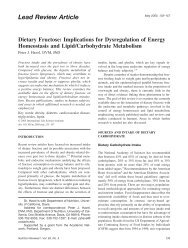Untitled
Untitled
Untitled
Create successful ePaper yourself
Turn your PDF publications into a flip-book with our unique Google optimized e-Paper software.
\<br />
\.
BY PAUL D. NAVAR, MD<br />
HP^<br />
Optimizing<br />
Testosterone Levels<br />
in Aging Men<br />
By the age of 80, a man's testosterone level may only<br />
be 20% of what it was in his youth. This decline in testosterone<br />
occurs gradually, starting as early as his mid-30s,<br />
and can result in an increased risk of life-threatening<br />
illnesses such as obesity, diabetes, and heart disease.<br />
Testosterone deficiency can also lead to a number of<br />
disturbing symptoms, including loss of stamina and<br />
lean muscle mass, reduced libido, anxiety, depression,<br />
and cognitive decline. Known as the andropause, these<br />
changes are the male equivalent of female menopause.<br />
Unlike menopause, however, the drop in testosterone<br />
is so gradual that the symptoms of andropause appear<br />
over a longer period of time and are often ignored for a<br />
while or are attributed to "getting older."<br />
The good news is that many symptoms of testosterone<br />
deficiency can be reversed by restoring youthful<br />
testosterone levels in a variety of ways. Millions<br />
of men are now using testosterone-building supplements<br />
and even testosterone itself for this reason. > ><br />
JULY 2008 I LIFE EXTENSION | 37
OPTIMtZtNC TESTOSTERONE LEVELS IN AGING MEN<br />
Recognition of an Increasingly<br />
Prevalent Problem<br />
Testosterone is the primai^ male sex hormone that<br />
is vital for sustaining proper erectile function and<br />
libido. It is also critically involved in building muscle,<br />
burning fat, and supporting endothelial function, energ>'<br />
level, mood, immune function, and bone density.<br />
Millions of men in the United States suffer from the<br />
effects of low testosterone levels. This population of<br />
testosterone deficient men will only grow in the future,<br />
as the number of aging American men increases.'<br />
Low testosterone is associated with increased<br />
morbidity and mortality. A recent study found that<br />
men with lower testosterone levels were more likely<br />
to die ft'om cardiovascular disease and all causes<br />
compared with men who had higher levels. The<br />
authors concluded that low testosterone may be a predictive<br />
marker for those at high lisk of cardiovascular<br />
disease.- Another review from the Baylor College of<br />
Medicine reported that there is a higher prevalence<br />
of depression, coronaiT heart disease, osteoporosis,<br />
fracture rates, frailty, and even dementia with low<br />
testosterone states.'<br />
You might now be asking yourself these questions—<br />
Why hasn't my doctor discussed these risks with me<br />
and why haven't I been tested for low testosterone<br />
levels Why am I just hearing about this<br />
Testosterone Supplementation—<br />
An Undeserved Shady Past<br />
The medical community has been slow to recognize<br />
the consequences of low testosterone levels in<br />
aging males and, in fact, wrongly believes that restoring<br />
youthful levels of testosterone is dangerous and<br />
unwarranted. Back in the mid-1900s, some dioig companies<br />
sold a synthetic and chemically altered testosterone<br />
called methyltestosterone. They pawned this<br />
chemical off as real testosterone, even though it does<br />
not naturally exist in the human body. After several<br />
years on the market, some men taking this particular<br />
chemical developed liver cancer.""^^ "Testosterone<br />
therapy" was then declared to be dangerous, and<br />
research on testosterone fell by the wayside.<br />
While testosterone is a member of the group<br />
of compounds known as "anabolic steroids," it is<br />
different and less potent than the illegal synthetic<br />
compounds that have been taken in excessive doses<br />
and abused. Beginning in the late 1980s, overambitious<br />
and unscrvipulous professional athletes began<br />
taking illegal anabolic steroids to gain an unfair<br />
competitive edge. Unfortunately, this abuse has<br />
wrongly clouded the important health benefits of<br />
prescribing testosterone therapy to correct its decline<br />
associated with aging and other diseases. In response<br />
to the sports abuse issue, federal law has made testosterone<br />
a controlled substance just like narcotics and<br />
amphetamines. Illegal-use penalties can be severe<br />
for any doctor who improperly prescribes anabolic<br />
steroids. Although this has made some doctors<br />
reluctant to prescribe testosterone, medical prescribing<br />
of the hormone jumped by 50% in four years<br />
fi'om 2001 to a total of 2.3 million prescriptions in<br />
2005." Some physicians do therefore appear to be<br />
increasingly recognizing the consequences of low<br />
testosterone levels in aging males.<br />
Evolving Opinions on<br />
Testosterone Replacement<br />
In November 2003, the Institute of Medicine<br />
declared that "existing scientific evidence does not<br />
justify claims that testosterone treatments can<br />
relieve or prevent certain age-related problems in<br />
men." Most age-management physicians today strongly<br />
disagree with that statement. There are hundreds of<br />
studies in the medical literature showing the health<br />
benefits and safety of testosterone therapy.<br />
In 2007, Drs. Miner and Seftel published a review<br />
of the medical literature on testosterone since the 2003<br />
Institute of Medicine Report.^ The summaiT of their<br />
article states: "Recent studies have demonstrated<br />
that hypogonadism [low testosterone] in men<br />
may be more prevalent than previously thought, is<br />
strongly associated with metabolic syndrome, and<br />
may be a risk factor for type 2 diabetes and cardiovascular<br />
disease. Clinical studies have shown that<br />
testosterone replacement therapy in hypogonadal<br />
38 I LIFE EXTENSION i JULY2008
men improves metabolic syndrome indicators and<br />
cardiovascular risk factors. Maintaining testosterone<br />
concentrations in the normal range has been<br />
shown to contribute to bone health, lean muscle<br />
mass, and physical and sexual function, suggesting<br />
that testosterone replacement therapy may<br />
help to prevent frailty in older men. Based on<br />
current knowledge, testosterone replacement<br />
therapy is unlikely to pose major health risks in<br />
patients without prostate cancer and may offer<br />
substantial health henefíts."<br />
Testosterone and Cardiovascular Health<br />
Let's take a closer look at what the medical<br />
literature says about the specific benefits of testosterone<br />
restoration. Many studies have shown an association<br />
between low testosterone levels and a higher<br />
prevalence of coronary artery disease**'" and aortic atherosclerosis.'"<br />
Lower testosterone levels are also associated<br />
with reduced pumping ability of the heart.''<br />
Recent studies suggest that testosterone-replacement<br />
may improve the symptoms of coronary artery<br />
disease. A placebo-controlled crossover study in men<br />
with ischémie heart disease and low testosterone<br />
levels reported that exercise time and the time to<br />
development of ischémie changes on a treadmill test<br />
were both increased with testosterone-replacement<br />
therapy." Another placebo-controlled study found<br />
that 12 weeks of oral testosterone-replacement therapy<br />
improved the ability of the brachial artery to dilate<br />
in men with coronary artery disease,'^ suggesting an<br />
improvement in endothelial function. These and other<br />
medical studies provide mounting evidence of the<br />
clinical benefits of testosterone-replacement therapy<br />
in men váih coronary artery disease.<br />
Testosterone and Insulin Resistance/Diabetes<br />
Type 2 diabetes is reaching epidemic proportions<br />
in America today. Likewise, metabolic syndrome—a<br />
condition marked by insulin resistance<br />
that dramatically increases the risk of heart disease<br />
and diabetes—is becoming increasingly more<br />
prevalent.<br />
Growing research suggests that low testosterone<br />
levels may be intimately linked with insulin resistance<br />
and its related conditions of metabolic syndrome and<br />
diabetes.'^ ''' Recent research suggests that between<br />
20% and 64% of men with diabetes have low testosterone<br />
levels; older men appear to be particularly<br />
susceptible.'^ Likewise, low serum testosterone is<br />
common among men with metabolic syndrome, and<br />
some scientists have proposed that low testosterone<br />
might serve as a prognostic tool for early detection of<br />
the condition.'''<br />
Optimizing Testosterone<br />
Levels in Aging Men<br />
• Testosterone, the chief male hormone, is<br />
essential for libido and erectile function, and<br />
plays a crucial role in mood, energy, bone<br />
health, and body composition.<br />
• Testosterone levels decline with age, usually<br />
beginning in a man's mid-30s. Diminishing<br />
testosterone levels have been linked vi/ith<br />
disorders such as depression, fatigue, obesity,<br />
and cognitive decline.<br />
• Low testosterone levels increase the risk of<br />
coronary heart disease as well as all-cause and<br />
cardiac mortality.<br />
• Restoring testosterone to youthful levels offers<br />
men a wealth of health benefits, including<br />
benefits for heart health, body composition,<br />
mood, and memory.<br />
• Bioidentical testosterone has not been found<br />
to have adverse effects on the healthy<br />
prostate gland—in fact, it may help improve<br />
prostate symptoms in men with low-normal<br />
testosterone levels. Testosterone therapy is<br />
contraindicated in men with prostate cancer.<br />
• Regular blood testing can help you and your<br />
physician decide if testosterone therapy is right<br />
for you. Optimizing testosterone levels requires<br />
a multi-pronged approach that includes<br />
optimal diet, proper nutrition, nutritional<br />
supplements, exercise, and bioidentical<br />
testosterone, if necessary.<br />
IULY2008 I UFE EXTENSION | 39
OPTIMIZING TESTOSTERONE LEVELS IN AGING MEN<br />
Restoring testosterone to youthful ranges may<br />
confer a wide array of benefits to men affected by<br />
type 2 diabetes. The reported benefits of testosterone<br />
administration in these men include improved glucose<br />
homeostasis (balanced sugar levels), reduction<br />
in abdominal fat, and improved erectile fimction.'^<br />
Likewise, scientists believe that testosterone replenishment<br />
may help reverse some of the key biochemical<br />
abnormalities that underlie metabolic syndrome, such<br />
as insulin resistance and central obesity.""^<br />
Testosterone and Body Composition<br />
With the obesity epidemic raging and its tremendous<br />
impact on the overall health of our nation's<br />
population, integrative physicians are particularly<br />
interested in the role testosterone plays in body composition.<br />
Testosterone appears to affect fat cell metabolism<br />
and fat loss in several ways through:<br />
• Inhibiting fat storage by blocking a key enzyme<br />
called lipoprotein Upase that is necessary for the<br />
uptake of fat into the body's fat cells. When fat<br />
cells are exposed to testosterone in a test tube,<br />
the activity of lipoprotein lipase is dramatically<br />
reduced.<br />
• Stimulating fat burning by increasing the<br />
number of certain receptors on the fat-cell<br />
membrane that release stored fat."<br />
• Increasing insulin sensitivity and improving<br />
lipid and insulin metabolism, while enhancing<br />
growth of muscle fibers and decreasing<br />
fat deposits.<br />
All of these effects benefit body composition by<br />
promoting lean body mass and reducing fat mass."* '''<br />
In a landmark study out of Sweden in 1991,<br />
researchers gave a group of overweight men supplemental<br />
testosterone for six weeks.^"^ After this time,<br />
they found the activity of the fat-storage enzyme<br />
lipoprotein lipase to be dramatically reduced In<br />
abdominal fat tissue. Waist and hip circumference<br />
also decreased in 9 of the 11 men.<br />
Furthermore, a recent review highlights numerous<br />
placebo-controlled trials that have demonstrated both<br />
significant increases in lean body mass and decreases<br />
in fat mass after varying courses of testosterone<br />
supplementation in older men.^' In these studies, the<br />
greatest favorable changes in body composition were<br />
seen in participants with low baseline testosterone<br />
levels who received testosterone therapy for a period<br />
in excess of 12 months.<br />
Testosterone and the Prostate<br />
A common misconception among physicians is<br />
that testosterone administration adversely affects the<br />
normal prostate. This idea is not suppor'ted by the<br />
medical literature. A 2002 study indicates that testosterone<br />
is actually beneficial for the prostate gland in<br />
the vast majority of cases. In this study, researchers<br />
looked at multiple parameters, including prostate volume,<br />
prostate-specific antigen (PSA) levels, and lower<br />
urinaiy tract symptoms in a group of men with low or<br />
low-normal testosterone levels." Of the 207 men studied,<br />
187 responded favorably to testosterone treatment.<br />
40 I LIFE EXTENSION | (ULY 2008
OPTIMIZING TESTOSTERONE LEVELS IN AGING MEN<br />
growth, it is possible that it can accelerate the growth<br />
of an existing prostate cancer. Cancer-screening tests<br />
such as a PSA test are necessai^ before replacement<br />
therapy. Testosterone-replacement therapy is contraindicated<br />
in men with known prostate cancer.<br />
The Importance of Blood Testin<br />
The most efficient way for me (or other doctors)<br />
to prescribe the proper dose of/ow-cosi individually<br />
compounded testosterone cream is for patients to<br />
bring their recent blood test results to my office<br />
during the initial visit. Life Extension's comprehensive<br />
Male Blood Test Panel provides the biochemical<br />
data I need to help safely restore testosterone<br />
to youthful ranges, vi/hile suppressing excess estradiol<br />
if necessary. The Male Blood Test Panel can<br />
be ordered by calling 1-800-208-3444. Í encourage<br />
men over age 35 to have this comprehensive blood<br />
test and evaluation performed annually.<br />
Life Extension members who reside in the<br />
Southern Utah area are welcome to call my office<br />
at 435-688-8582 to schedule an appointment for a<br />
medical consultation.<br />
These positive responders all showed improvement<br />
in almost evei-y parameter measured: their prostate<br />
glands all decreased in size, PSA was lower, and udnaiy<br />
symptoms such as frequency, urgency, dribbling,<br />
and getting up at night to urinate all improved.<br />
In a separate recent study that looked at a similar<br />
group of men, the authors observed that "No treatment-related<br />
change was observed in prostate histology,<br />
tissue biomarkers, gene expression, or cancer incidence<br />
or severity. Treatment-related changes in prostate<br />
vohiine, serum PSA, voiding symptoms, and urinary<br />
flow were miiior.""<br />
On the question of whether testosterone therapy<br />
causes prostate cancer, the answer clearly appears to<br />
be no. In a landmark review article published in 2004<br />
in the New England Journal of Medicine, the authors<br />
report "there appears to be no compelling evidence<br />
at present to suggest that men with higher testosterone<br />
levels are at greater risk of prostate cancer<br />
or that treating men who have hypogonadism [low<br />
testosterone] with exogenous androgens increases<br />
this risk."-* However, since testosterone stimulates cell<br />
Testosterone and Depression<br />
Depression is a leading cause of disability worldwide.<br />
In a recent study of 3,987 older men in Australia,<br />
researchers found that those with depression had<br />
significantly lower testosterone concentrations than<br />
men without depression.^"^ The authors stiggested that<br />
older men with depression may benefit from systematic<br />
screening of testosterone levels and testosterone<br />
supplementation where appropriate. In my own practice,<br />
I have seen both younger and older men with low<br />
testosterone levels and depression improve remarkably<br />
after testosterone supplementation. Other studies<br />
have shown an improvement in depression scores<br />
with testosterone therapy in patients with depression<br />
who are unresponsive to conventional treatments.^"'^^<br />
Further research in this area is ongoing.<br />
Testosterone Improves Cognitive Abilities<br />
Testosterone supplementation clearly seems to be<br />
beneficial for proper male mental and verbal function.<br />
Several studies have shown that decreased serum<br />
testosterone levels appear to adversely affect verbal<br />
memoi-y in healthy young men. Short-term testosterone<br />
administration exerts a beneficial effect on spatial<br />
and verbal memory and enhances cognitive fimction<br />
in healthy<br />
)ULY2008 I LIEE EXTENSION | 41
Management of Low Testosterone Levels<br />
Optimizing testosterone levels in men requires a<br />
multi-faceted approach that includes proper lifestyle,<br />
nutrition, uutritional supplements {such as lignan<br />
and plant extracts),^^"'-' dietary modifications, and<br />
exercise, as well as testosterone supplementation and<br />
other prescriptive approaches when indicated.<br />
Initially, a medical histoi7 and physical examination<br />
should be performed, along with a blood-testing<br />
panel that includes not only testosterone levels, but<br />
also olher important parameters such as fasting<br />
glucose, PSA, estradiol, and complete blood counts<br />
(CBC). It is important to work closely with a knowledgeable<br />
physician who is readily accessible and<br />
who can adjust treatment as needed. Careful, thoughtful<br />
optimization of testosterone levels with a comprehensive<br />
evaluation and treatment plan can result in<br />
dramatic improvements in one's overall health and<br />
well-being.<br />
For men who no longer produce enough testosterone,<br />
an experienced doctor can prescribe a topically<br />
applied cream to restore testosterone to youthful<br />
ranges. These testosterone creams usually come in<br />
delivery systems that enable the precise amount of<br />
this hormone to be applied to the skin each day for<br />
absorption into the bloodstream.<br />
The reason testosterone cream is used as opposed<br />
to tablets is that the oral ingestion of testosterone<br />
can result in rapid degradation in the liver and wildly<br />
inconsistent blood levels. A testosterone cream, on<br />
the other hand, gradually releases into the bloodstream,<br />
which is more analogous to the way testosterone<br />
is naturally secreted each day by the testicles of<br />
younger men.<br />
Compared with brand name testosterone topical<br />
drugs, consumers can save more than 85% by<br />
using natural testosterone cream made by a compounding<br />
pharmacy. For example, the name brand<br />
Androgel* cream costs around $225 for a month's<br />
supply. The identical amount of natural testosterone<br />
can be obtained from a compounding pharmacy lor<br />
less than $25 a month. For those patients in whom a<br />
cream is not the best choice, testosterone injections<br />
can be prescribed.<br />
Follow-up blood testing 30-60 days later is important<br />
to ensure that PSA, estradiol, and other blood<br />
markers stay in normal ranges. Some men will<br />
aromatize (or convert) testosterone into estrogen,<br />
which necessitates the use of a drug like Arimidex® or<br />
nutrient-lifestyle changes to inhibit excess aroniatase<br />
activity. •<br />
If you have any questions on the<br />
scientific content of this article, please call a<br />
Life Extension Health Advisor at 1-800-226-2370.<br />
About Paui Navar, MD<br />
Dr. Paul Navar specializes in integrating bioidentical<br />
hormone-replacement therapy, lifestyle/nutritional<br />
programs, and the best of conventional medical<br />
treatments to achieve optimal health for his patients.<br />
His integrative medical practice uses the most effective<br />
treatments from conventional medicine and natural<br />
medicine to restore health and vitality to patients<br />
with hormone- and age-related health decline.<br />
Paul D. Navar, MD can be reached at:<br />
166 N. 300 W., Suite 3, St. George, Utah 84770<br />
Email: info@drnavar.com • Website: www.drnavar.com<br />
Phone: (435) 688-8582 • Fax: (435) 688-1995<br />
Editor's note: Whether supplementing with natura! testosterone<br />
or not, aging men may consider using the prescription<br />
drug Avodart® to reduce levels of dihydrotestosterone,<br />
a potentially dangerous metabolite of testosterone. Studies<br />
show that men using agents that lower dihydrotestosterone<br />
have reduced rates of both benign and malignant prostate<br />
disorders.'"<br />
42 I LIFE EXTENSION | JULY 2008
OPTIMIZING TESTOSTERONE LEVELS IN AGING MEN<br />
References<br />
1. Available at: htipi/Zu'u^'.census.gov/ipc/www/usinterimproj/<br />
nalpmilabO2a.pdf, Accessed April 24, 2008.<br />
2. Khaw KT, Dowsetl M, Folkerd E, el al. Endogenous testosterone<br />
and mortality due lo all causes, cardiovascular disease, and cancer<br />
in men: European prospective investigation into cancer in Norfolk<br />
(EPIC-Nortolk) Prospective Population Study. Circulation.<br />
2007 Dec 4;1I6(23):2694-7O1.<br />
3. Tan RS. Sala/ar JA. Risks of testosterone replacement therapy in<br />
ageing men. Expert Opin Dmg Saf. 2004 Nov;3(6);599-606.<br />
4. Available at: httpiZ/uww,drugs.com/ppa/methyltestoslerone.html.<br />
Accessed April 28, 2008.<br />
.S. Fanell GC, Joshua DE, Uren RF, Baird PJ, Perkins KW.<br />
Kionenberg H. Andi-ogen-induced hepatoma. Lancet.<br />
1975Feb22;M7904):430-2.<br />
b. The extent and nature of testosterone use [news release].<br />
Fairiield, Conn: IMS Health, Inc: SepLember 2006.<br />
7. Miner MM, Seftel AD. Testosterone and ageing: what have we<br />
learned since the Institute of Medicine reporl and what lies ahead<br />
Int J Clin Pract. 2007 Apr;61(4):622-32.<br />
8. Jone.s RD, Nettlesbip JE, Kapoor D, Jones HT, Cbanner KS.<br />
Testosterone and atherosclerosis in aging men; purpoited<br />
associalion and clinical implications. Am J Cardiovase Drugs.<br />
2005:5(3):l4!-54.<br />
9. Dobrzycki S, Sei^watka W, Nadlewski S. el al. An assessment of<br />
correlations between endogenous sex honnone levels and tbe<br />
extensiveness of coronary heart disease and ibe ejection Traction<br />
of the left ventricle in niales. J Med Invest. 2003 Aiig;50(3-4): 162-9.<br />
10. Hak AE, Witteman JC, de Jong FH. et a!. Low levéis of endogenous<br />
andi'ogens increase ibe risk of atherosclerosis in elderly men: ibe<br />
Rotterdam study. J Clin Endoainol Metab. 2002 Aug;87(8):3632-9.<br />
11. Malkin CJ, Pugh PJ. Monis PD, et al. Teslosterone replacement in<br />
hypogonadal men with angina improves iscbaemic threshold and<br />
quality of life. Heart. 2004 Aug:90(8):87î-6.<br />
12. Kang SM. Jang Y, Kim JY, el al. Effect of oral adniinislration<br />
of teslosterone on bracbial aneriai vasoreactivity in men with<br />
coronarv arteiy disease. Am J Cardiol. 2002 Apr 1 ;89(7):862-4.<br />
13. Zou B, Sasaki H, Kumagai S. Association between Relative<br />
Hypogonadism and Metabolic Syndrome in Newly Diagnosed<br />
Adult Male Patienls with Impaired Glucose Tolerance or<br />
Type 2 Diabete.s Mellitus. Metah Svndr Relat Disord. 2004<br />
Spring;2il):39-48.<br />
14. Spark RF. Testosterone, diabetes meltitus. and the metabohc<br />
syndrome. Ciin Urol Rep. 20O7 Nov;8(6):467-71.<br />
15. Kalyani RR, Dobs AS. Androgen deficiency, diabetes, and tbe<br />
metabolic syndrome in men. Curr Opin Endocrino! Diabetes Obes.<br />
2007Jun;l4(3):226-34.<br />
16. Fukui M. Kitagawa Y, Ose H, Ha.segawa G, Yoshikawa T,<br />
Nakamura N. Role of endogenous androgen against insulin<br />
resislance and aibero- sclerosis in men witb type 2 diabetes.<br />
Ciin- Diabetes Rev. 2007 Feb:3( 1 ):25-31,<br />
17. De Pergola G. The adipose tissue metabolism: role of testosterone<br />
and dehydroepiandrosterone. ¡lit J Obes Relat Melab Disord.<br />
2000 Jun;2-J Suppl 2S59-S63.<br />
i 8. Naharci MI, Pinai" M, Bolu E, Olgun A. Effect of testosterone<br />
on insulin sensilivity in men with idiopatbic bypogonadotropic<br />
hypogunadism. Eiidocr Pracr. 2007 Oct:13(6):629-35.<br />
19. Saad F. Gooren LJ, Haider A. Yassin A. A dose-response study of<br />
testosterone on sexual dysfunction and features of tbe metabolic<br />
syndrome using leslosterone gel and parenterid testosterone<br />
undecanoale. J AndivL 2008 Jan-Feb;29( I ): 102-5.<br />
20. Rebuffe-Scnve M, Mai'in P, Bjorntorp P. Effect of lesto.sterone<br />
on abdominal adipose tissue in men. ¡nt J Obes. 1991<br />
Nov;l5(in:79I-5.<br />
21. Allan CA, Slrauss BJ, McLacblan RL Body composition, metabolic<br />
syndrome and testosterone in ageing men. ¡nt J Intpot Res.<br />
2007Sep:l9(5}:448-57.<br />
22. Pechersky AV, Mazurov \T, Semiglazov VF, et al. Andiogen<br />
administration in middle-aged and ageing men: effects of oral<br />
testosterone undecanoate on diiiydrotestoslerone. oestradiol and<br />
prostate volume, ¡ul J Androl. 2002 Apn25(2):119-25.<br />
23. Marks LS, Mazer NA, Mostaghel E, et al. Effect of testosterone<br />
replacement therapy on prostate tissue in men wilb late-onset<br />
bypogonadism: a randomized controlled trial. 74AM. 2006<br />
Nov I5;296(19):23.S1-6I.<br />
24. Rboden EL, Morgentaler A. Risks of testosterone-replacement<br />
tberapy and recommendations for monitoring. N Eng! J Med.<br />
2004 Jan 29;350(5):482-92.<br />
25. Almeida OP Yeap BB, Hankey GJ, Jamrozik K. Flicker L. Low<br />
tree teslosterone concentration as a potentially ti'eatable cause of<br />
depressive symptoms in older men. Arch Gen Psychiatry.<br />
2008Mar;65(3):283-9.<br />
26. Pope HG. Jr., Cohane GH, Kanayama G, Siegel AJ. Hudson<br />
JL Testosterone gel supplementation for men with i-etractory<br />
depression: a landomized. placebo-controlled trial.<br />
.4fij / Psvchialr^-. 2003 Jan:l60(I): 105-11.<br />
27. Seidman SN, Rabkin JG. Testosterone replacement therapy for<br />
bypogonadal men witb SSRl-refi actoiy depression. J Ajfect Disord.<br />
1998Mar:48(2-3):157-6l.<br />
28. Chetrier MM, Aslhana S, Plymate S, et al. Testosterone<br />
supplementation improves spatial and verbal memoiy in bcatlby<br />
older men. Neurology. 2001 Jul I0;57(n:80-8.<br />
29. Cben-ier MM, Anawalt BD, Herbst KL, et al. Cognitive effects of<br />
sborl-term manipulation of serum sex steroids in healthy young<br />
men. J Clin Endocriiml Metab. 2002 JuI;87(7):3090-6.<br />
30. Cberrier MM, Craft S, Matsuinotn AH. Cognitive changes<br />
associated witb supplementation of testosterone or<br />
di hydro testosterone in mildly hypogonadal men: a pivliminary<br />
vepon.J.Aiidrol. 2003 Jul:24(4):568-76.<br />
31. Cbeirier MM, Plymate S. Mohan S, et al. Relationship<br />
between testosterone supplementation and insulin-like<br />
growth factor-I levels and cognition in healthy older men.<br />
Psychoneuroendocrinology. 2004 Jan:29(I):65-82.<br />
32. Tou JC, Chen J, Tbompson LU. Dose, timing, atid duration of<br />
flaxseed exposure affect reproductive indices and sex bomitme<br />
levels in rats. J To.ùcol Environ Health A. 1999 Apr 23;.S6(8):.=555-70.<br />
33. Adimoelja A. Pbytochemicals and tbe breaklbrough of traditional<br />
herb.s in tbe management of sexual dysfunctions. Int J Androl.<br />
2000:23 Suppl 2:82-4.<br />
34. Tindali DJ, Riltmaster RS. Tbe rationale for inhibiting 5alpbareductase<br />
isoenzymes in tbe prevention and treatment of prostate<br />
cancer. 7 iVo/. 2008 Apr: 179(4): 1235-42.<br />
JULY 2008 I LIFE EXTENSION | 43





